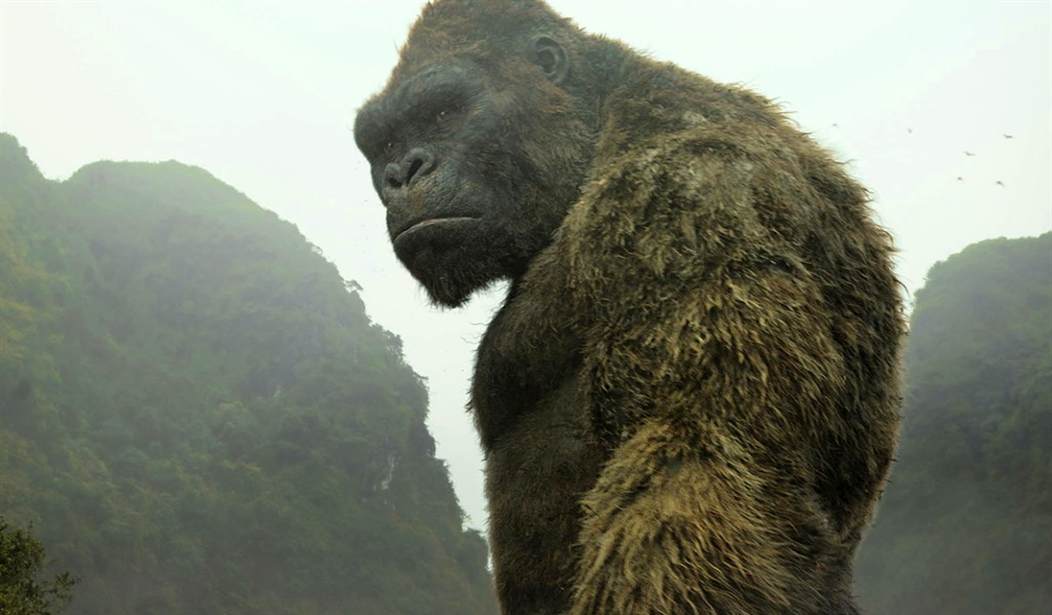No, you didn't accidentally click on the satire site The Babylon Bee. Yes, this is RedState — and the above headline is legit. Also yes: If you believe everything you're about to read, I have a bridge I'd love to sell you.
While the fictional King Kong died after falling off the Empire State Building, NBC News has reported that a giant ape sometimes dubbed the “real King Kong” was wiped out in a less dramatic — albeit just as tragic — way.
According to NBC, Gigantopithecus blacki — standing 10 feet tall and weighing up to 650 pounds — roamed the forested plains of southern China's Guangxi region hundreds of thousands of years ago, until it went extinct due to climate change.
But how could that be, you ask? I mean, there was nary a conservative (translation: "climate-change denier") on the planet at the time.
The sad tale goes something like this: According to new research published last Wednesday in the journal Nature, reported NBC, the giant ape was driven to extinction by climate change that put its favorite fruit out of reach during the dry season.
Yingqi Zhang, the study’s lead researcher, told NBC News:
[The herbivore ape made a] fatal mistake of being reluctant in changing [scc] its food preference to find new, more nutritious food. When environments change, the preferred food by [sic] this giant ape became less available. But this giant ape didn’t adapt his dietary preferences. It still relied on his less nutritious food.
Hold the bus.
I'm neither a scientist nor an expert on climate change. But... it appears to me that Zhang unintentionally made a key point made by climate-change skeptics: The Earth's climate has gone through multiple long-term cycles for billions of years. Let's look at ice ages, for example. (Emphasis, mine.)
An ice age is a long interval of time (millions to tens of millions of years) when global temperatures are relatively cold and large areas of the Earth are covered by continental ice sheets and alpine glaciers. Within an ice age are multiple shorter-term periods of warmer temperatures when glaciers retreat (called interglacials or interglacial cycles) and colder temperatures when glaciers advance (called glacials or glacial cycles).
At least five major ice ages have occurred throughout Earth’s history: the earliest was over 2 billion years ago, and the most recent one began approximately 3 million years ago and continues today (yes, we live in an ice age!). Currently, we are in a warm interglacial that began about 11,000 years ago. The last period of glaciation, which is often informally called the “Ice Age,” peaked about 20,000 years ago. At that time, the world was on average probably about 10°F (5°C) colder than today, and locally as much as 40°F (22°C) colder.
I'm not conflating climate change with ice ages, but Zhang did say "When environments change ..." suggesting that, as is the case with ice ages, the Earth's climate sometimes warms, and sometimes cools, which sounds both reasonable and factual. However, when climate alarmists like Al Gore, John Kerry, and Joe Biden run around histrionically wailing that (anthropogenic) climate change is "the existential threat to mankind," I'm out — and I'm far from the Lone Ranger.
Here's more, via NBC:
Until now, the reason for the species' demise had been a mystery since one tooth was found in a Hong Kong apothecary in 1935 by the German-Dutch paleontologist Gustav Heinrich Ralph von Koenigswald. It was marketed as a “dragon tooth.”
The discovery prompted a wider search for more fossils, but after 85 years, only 2,000 isolated teeth and parts of the lower jaw have been found. No parts other than the skull have been recovered.
Without a “precise timeline” for a creature's extinction, “you’re looking for clues in the wrong places,” said one of the study's lead authors, Kira Westaway, a geochronologist at Macquarie University in Sydney.
But researchers were able to use one of the latest techniques, called “luminescence dating,” which enabled them to date the soil around the fossils in 22 caves in southern China.
That helped them conclude that the giant apes died out sometime between 295,000 years ago and 215,000 years ago.
Westaway added:
Giganto couldn’t really extend its range for foraging to find more suitable food, because it’s so large, and orangutans are really small, mobile and quite agile.
One X user summed up my thoughts, perfectly:
Wow, an entire species of giant ape went extinct because they couldn't reach their favorite fruit. What a sad and pathetic way to go. I mean, who knew that a lack of fruit-picking skills could be so deadly? But hey, let's all blame climate change for this extinction, and ignore the fact that species go extinct all the time, and that many animals are perfectly capable of adapting to changing environments. Because that's definitely going to solve all the problems of biodiversity loss.
Dodos and passenger pigeons were unavailable for comment.
Wow, an entire species of giant ape went extinct because they couldn't reach their favorite fruit. What a sad and pathetic way to go. I mean, who knew that a lack of fruit-picking skills could be so deadly? But hey, let's all blame climate change for this extinction, and ignore…
— Joe (@JoeMaristela) January 13, 2024
Yeah, I'm with Joe.
The Bottom Line
NBC News, by pushing the "new research," would have us believe that because Giganto couldn't reach its favorite fruit — due to climate change — it starved itself into extinction.
Do you buy that? If so, let's talk about that bridge.














